BLOG
Refroid launches made-in-India CDU
Indian firm Refroid Technologies has launched its own Coolant Distribution Unit (CDU).
The company has announced the launch of the SentraFlo Series—the nation's first indigenously developed Liquid-to-Liquid CDU designed for Direct-to-Chip (DTC) liquid cooling applications.
With customizable capacities ranging from 200kW to 2MW, the offering includes CDUs, rack manifolds, and a secondary fluid network (SFN) plumbing architecture.
Refroid SentraFlo CDU systems will begin shipping by end of June 2025.
Based in Hyderabad, Refroid offers single-phase immersion pods and load banks. The company partnered with Bharat Petroleum earlier this year to develop a made-in-India coolant.
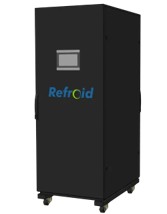
Accelsius joins University of Texas at Arlington for COOLERCHIPS projects
Liquid cooling firm Accelsius has joined one of the projects within the US Department of Energy’s (DOE) ARPA-E COOLERCHIPS initiative.
The project, “Holistic Co-Design of Novel Hybrid Cooling Technology for the Data Center of the Future,” will develop a next-generation hybrid architecture that combines direct-to-chip evaporative cooling with air-based solutions such as rear door heat exchangers.
Accelsius will provide its MR250 Coolant Distribution Unit (CDU); the multi-rack, in-row, 250kW two-phase offering will be incorporated into the project’s test infrastructure at the University of Texas at Arlington campus, with general availability planned for late 2025.
Announced in 2022, COOLERCHIPS (Cooling Operations Optimized for Leaps in Energy, Reliability, and Carbon Hyperefficiency for Information Processing Systems) program aims to reduce total cooling energy consumption to less than 5 percent of a data center’s IT load.
The Arlington-led project is one of 15 within the COOLERCHIPS program; companies within the initiative include JetCool, Intel, Raytheon, HP, Nvidia, and Flexnode.
Texas-based Accelsius was founded in 2022 by Innventure to commercialize technology developed by Nokia's Bell Labs. Accelsius’ NeuCool technology had been developed for five years by Bell Labs but was not productized. No Bell Labs staff came to Accelsius.
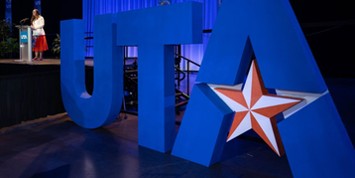
Skeleton Technologies launches graphene-based supercapacitor power shelf
Energy storage firm Skeleton Technologies has developed a new power shelf for data centers that uses graphene-based supercapacitors.
The company has launched GrapheneGPU, a peak-shaving capacity shelf that ditches Lithium for supercapacitor energy storage based on Skeleton Technologies’ patented Curved Graphene technology.
The shelf can manage power fluctuations that occur with GPU use. Skeleton said many data centers rely on artificial loads (aka dummy loads) during idle phases to maintain a constant power draw. While this helps stabilize operations, the approach leads to significant energy losses, with the company saying up to 45 percent of energy can be wasted as heat. GrapheneGPU stores energy during idle periods and releases it during peak demand, effectively smoothing out the fluctuations. This eliminates the need for dummy loads, reduces cooling requirements.
The 1U PCS 50 offers 60kW peak power in a 48-volt DC system, while the 4U PCS 400 offers 160kW peak power in a 400-volt DC system. Both are available in both air and liquid-cooled options.
Initial shipments from the company’s German site are scheduled for June 2025. US manufacturing expansion is scheduled for the first quarter of 2026.
Founded in 2009, Skeleton offers battery storage solutions utilizing its graphene-based batteries. The company also offers the SkelGrid supercapacitor-based energy storage system, which can offer up to 3MW in a single rack as well as larger modules. The company says it has more than 100MW of grid and industrial installations globally.
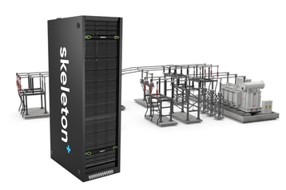
NVIDIA Announces Financial Results for First Quarter Fiscal 2026
NVIDIA (NASDAQ: NVDA) today reported revenue for the first quarter ended April 27, 2025, of $44.1 billion, up 12% from the previous quarter and up 69% from a year ago.
On April 9, 2025, NVIDIA was informed by the U.S. government that a license is required for exports of its H20 products into the China market. As a result of these new requirements, NVIDIA incurred a $4.5 billion charge in the first quarter of fiscal 2026 associated with H20 excess inventory and purchase obligations as the demand for H20 diminished. Sales of H20 products were $4.6 billion for the first quarter of fiscal 2026 prior to the new export licensing requirements. NVIDIA was unable to ship an additional $2.5 billion of H20 revenue in the first quarter.
For the quarter, GAAP and non-GAAP gross margins were 60.5% and 61.0%, respectively. Excluding the $4.5 billion charge, first quarter non-GAAP gross margin would have been 71.3%.
“Our breakthrough Blackwell NVL72 AI supercomputer — a ‘thinking machine’ designed for reasoning— is now in full-scale production across system makers and cloud service providers,” said Jensen Huang, founder and CEO of NVIDIA.
NVIDIA will pay its next quarterly cash dividend of $0.01 per share on July 3, 2025, to all shareholders of record on June 11, 2025.
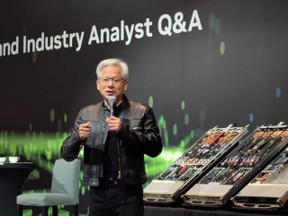
DP World Australia awards DXN with an AU$2m contract for two data centers
Logistics firm DP World Australia has awarded DXN with an AU$2 million ($1.3m) contract for two data centers.
DXN is an Australian data center provider specialising in prefabricated modular buildouts. DP World Australia is the local branch of DP World, an Emirati logistics company.
DXN is contracted to deliver the two units to DP World’s facility in Port Botany, New South Wales by Q3 2025. Port Botany is located south of Sydney and directly east of Sydney Airport.
DXN has capitalized on the needs of Australia’s mining industry, having done business with companies including Stanmore Coal, AngloAmerican, gold miner Newcrest, and Pilbara Minerals. It has also delivered modules to Boeing and Covalent Lithium.
Earlier this year, the company launched a liquid-cooled module available in 1MW or 2MW designs.
DP World, founded in 1972 as a local port operator in Dubai, operates on all continents.

Nvidia to launch new Blackwell-based chipset for Chinese market
Nvidia is planning to launch a new AI chipset for the Chinese market, designed to comply with US export rules.
According to a report from Reuters, the GPU will form part of Nvidia’s Blackwell family of chips, with mass production expected as early as June.
A second chip, also based on Blackwell architecture and designed for the Chinese market, is likely to begin production in September, Reuters further reported.
Citing sources “familiar with the matter,” Reuters reported that the first chip set for production will be based on Nvidia's RTX Pro 6000D offering that uses GDDR7 memory instead of HBM. It will be priced between $6,500 and $8,000 – lower than the cost of the company’s now-restricted H20 chip – reflecting its diminished specifications and manufacturing requirements.
First announced in 2023, Nvidia’s H20 GPUs are a less sophisticated version of its H100 processors and were designed specifically for the Chinese market in compliance with US export controls. However, in April 2025, the US government imposed additional restrictions on exports of Nvidia’s H20 chips to China, a move that Nvidia said would cost it approximately $5.5 billion in charges associated with H20 products for inventory, purchase commitments, and related reserves.
The company has since said it also had to walk away from $15bn in sales as a result of the new restrictions.
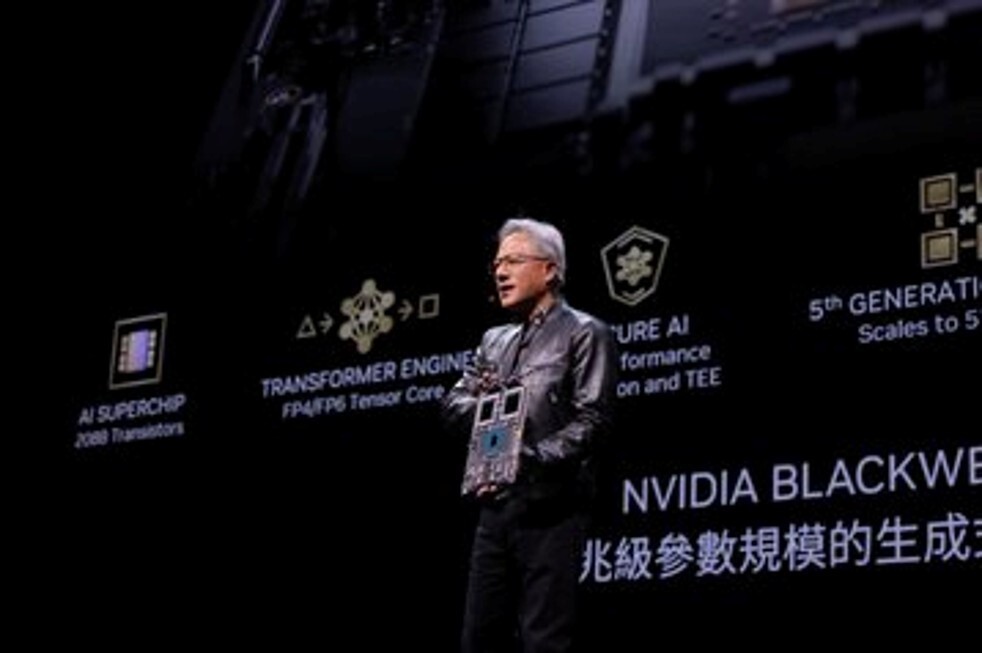
Nvidia server makers solve Blackwell technical issues, ramp up shipments of GB200 racks
Suppliers including Dell, Foxconn, Inventec, and Wistron have ramped up production of Nvidia Grace Blackwell racks, having resolved technical issues that had previously delayed shipments of the product.
Per a report in the Financial Times, the companies have made a “series of breakthroughs,” allowing them to start shipping the GB200 servers to customers.
According to comments made by an engineer from one of Nvidia’s partner manufacturers at this month’s Computex event in Taiwan, internal tests showed “connectivity problems” with the AI servers, but the suppliers have been able to work with Nvidia, and the issue was ultimately solved two to three months ago.
Software bugs, inter-chip connectivity problems, and leaking liquid cooling systems were also reported by engineers, the FT said. As a result, suppliers have increased the number of testing protocols the racks are subject to before shipping them to customers.
the FT claimed that in order to accelerate deployment of the incoming GB300 servers, Nvidia has compromised on aspects of its design, including reverting to the chip board layout – dubbed Bianca – currently used in the GB200 rack, as opposed to moving forward with its new Cordelia layout, which would allow for the replacement on individual GPUs, making maintenance of the system easier.
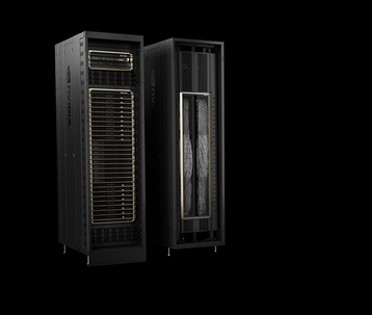
TSMC to open chip design center in Munich, Germany
TSMC is planning to open a chip design center in Munich, Germany.
The company announced the facility during its European Technology Symposium in Amsterdam, the Netherlands, this week.
The center will support European customers in designing high-density, high-performance, and energy-efficient chips, with a focus on automotive, industrial, AI, and IoT applications, president of TSMC Europe, Paul de Bot, told attendees, in comments reported by Reuters.
TSMC currently has nine other chip design centers across the world, located in Canada, China, Japan, Taiwan, and the US, but the Munich facility will be the company's first in Europe.
Germany is also home to TSMC’s first European chip fab, currently under construction in Dresden. Dubbed ESMC (European Semiconductor Manufacturing Company), the facility is a collaborative effort between TSMC and NXP, Infineon, and Bosch, with the European trio each owning a 10 percent stake in the plant.
The total cost of the project is expected to be more than $10bn, with the plant due to be operational by 2027. When complete, the site will produce 40,000 wafers a month. However, TSMC has previously said the fab will not be used to manufacture the company’s most cutting-edge chips, instead focusing on 28nm, 22nm, and 16/12nm nodes.
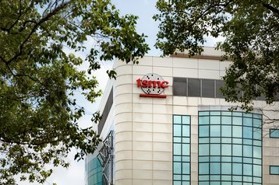
DOE's LBNL selects Dell-Nvidia system for NERSC-10 'Doudna' supercomputer
The US Department of Energy (DOE) has selected Dell to supply the next supercomputer for Lawrence Berkeley National Laboratory in Berkeley, California.
Featuring Nvidia chips, the supercomputer will be named Doudna after UC Berkeley scientist Jennifer Doudna, who co-invented CRISPR gene editing technology.
Set to be deployed at the National Energy Research Scientific Computing Center (NERSC), the supercomputer will be built with Nvidia's Vera Rubin GPUs and CPUs and is set to be built in 2026.
The system will use Dell's ORv3 direct liquid-cooled technology, Dell Integrated Rack Scalable Systems, and PowerEdge servers. It will also feature Nvidia's Quantum-X800 InfiniBand networking.
Perlmutter is currently the 19th most powerful supercomputer in the world, per Top500, at 79.23 petaflops. It boasts 3.8 exaflops of theoretical AI performance.
Jensen Huang, founder and CEO of Nvidia, added: “Doudna is a time machine for science - compressing years of discovery into days. Built together with DOE and powered by Nvidia’s Vera Rubin platform, it will let scientists delve deeper and think bigger to seek the fundamental truths of the universe.”

Equinix's SG1 data center in Singapore hit by outage during maintenance
Equinix's SG1 data center in Singapore saw two data halls go offline in a major outage.
The 31 May incident lasted more than an hour, and caused widespread service issues across the country.
The facility at 20 Ayer Rajah Crescent has 13MW of capacity and spans more than 100,000 sq ft.
Multiple Internet Service Providers were impacted by the outage, including Singtel, StarHub, and ViewQwest.
The company said it will work with Equinix to discover the root cause.
SG1 last suffered an outage in October 2023, when an issue with the chilled water system brought down banking apps, WhatsApp, and Call of Duty.
The facility also saw service disruptions in 2013, during scheduled power maintenance.
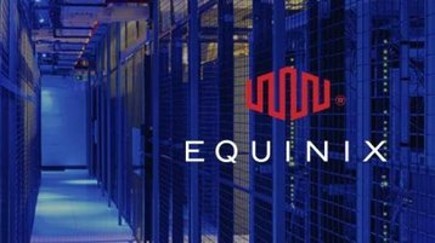
Microsoft opens its first data center in Indonesia
Microsoft has officially launched its first data center in Indonesia, called the Indonesia Central Cloud Region, on May 27, 2025, at Jakarta.
Minister of Communication and Digital, Meutya Hafid, represented President Prabowo Subianto at the event.
The data center is expected to contribute around US$ 2.5 billion to the economy and create 60,000 jobs by 2028.
Microsoft will also support digital training for 1 million people, with 840,000 already participating in AI capability-building.

Oracle to spend $40bn on Nvidia GPUs for OpenAI Texas data center
Oracle is set to spend around $40 billion on Nvidia chips for OpenAI's Stargate data center in Texas.
As reported by the Financial Times, the chips will be housed in OpenAI's upcoming data center in Abilene, Texas, the first of the Stargate projects.
According to the FT report, and citing people 'familiar with the matter,' Oracle will purchase around 400,000 of Nvidia's GB200s to lease to OpenAI.
The Abilene campus is being developed by Crusoe in partnership with Oracle, on land owned by Lancium, and is expected to eventually have eight buildings and a total of 1.2GW of capacity.
Construction of the second phase, consisting of six more buildings and another gigawatt of capacity, began in March 2025 and is expected to be energized in mid-2026. Oracle has agreed to lease the site for 15 years.
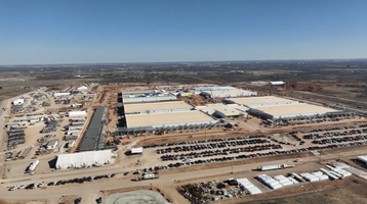
Leave A Reply
LOGO
This stunning beach house property is a true oasis, nestled in a serene coastal community with direct access to the beach.
Opening Hours
Monday - Friday : 9AM to 5PM
Sunday: Closed
Closed during holidays
Contact
+18888888888
hezuo@eyingbao.com123 West Street, Melbourne Victoria 3000 Australia



